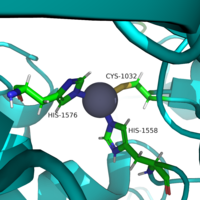User:Asif Hossain/Sandbox 1
From Proteopedia
| Line 16: | Line 16: | ||
===Key Residues=== | ===Key Residues=== | ||
===Binding Pocket=== | ===Binding Pocket=== | ||
| + | <scene name='81/811085/Binding_site/2'>Binding Pocket</scene> | ||
==Mechanism== | ==Mechanism== | ||
| Line 32: | Line 33: | ||
</StructureSection> | </StructureSection> | ||
== References == | == References == | ||
| + | 1. Whitehead, L., Dobler, M. R., Radetich, B., Zhu, Y., Atadja, P. W., Claiborne, T., ... & Shao, W. (2011). Human HDAC isoform selectivity achieved via exploitation of the acetate release channel with structurally unique small molecule inhibitors. Bioorganic & medicinal chemistry, 19(15), 4626-4634. | ||
| + | |||
<references/> | <references/> | ||
Revision as of 20:24, 2 April 2019
Contents |
Histone Deacetylase 8 (HDAC 8)
Introduction
Histone deacetylase 8 (HDAC 8) is an enzyme that plays a role in controlling gene expression. Specifically, it catalyzes the removal of an acetyl group off of the ε-amino-lysine sidechain of N-terminal core of Histone proteins. By removing the acetate ion, the reclaimed positive charge on the lysine sidechain is able to interact with the negative charge on the DNA. As a result, DNA will bind more tightly to the histone protein reducing transcription and expression.
Function
Histones
Acetylation
| |||||||||||
References
1. Whitehead, L., Dobler, M. R., Radetich, B., Zhu, Y., Atadja, P. W., Claiborne, T., ... & Shao, W. (2011). Human HDAC isoform selectivity achieved via exploitation of the acetate release channel with structurally unique small molecule inhibitors. Bioorganic & medicinal chemistry, 19(15), 4626-4634.

